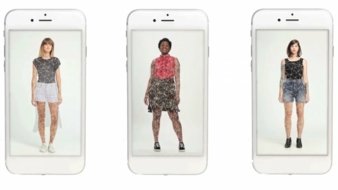29/11/2022 – Modelling clothing with customers’ photos
Walmart introduces virtual try-on technology
Multinational retail corporation Walmart Inc, upgrades consumer experience for fashion and apparel through AI-powered virtual try-on technology.
The virtual try-on technology hails from Walmart’s 2021 acquisition of Zeekit and their virtual fitting room platform sited at Tel Aviv.
The “Be Your Own Model” concept allows online shoppers to visualize clothing on models that look like themselves in both appearance, body type and with their own skin tone using their own photos to see how clothing looks on them, instead of choosing one of the existing fashion models. Before, Walmart.com customers could select from among dozens of different models to find one who best looked like them to see how clothing would likely look on their own body, across a range of apparel items.
The computer vision and neural network-powered patented feature developed by the Israelian start-up is capable of analyzing catalog images of garments to create a dressed image. The use of neural networks helps to determine the different variations of a product, including size, color, and other factors – like fabric draping or sleeve length, for example.
A much more realistic image
Thus a much more realistic imagery becomes true than some other experiences where a photo is simply laid overtop another image, Walmart says. This makes it feel different from other technology, like AR-enabled shopping, notes Cheryl Ainoa, SVP of New Businesses and Emerging Tech, Walmart Global Tech. “Where we didn’t feel like customers were satisfied is that a lot of the AR experiences are basically the equivalent of taking and laying a flat image on top of a flat image,” she says. “That doesn’t let you actually experience what this article of clothing is going to look like on me.”
Initially, Walmart presented its virtual try-on options across models ranging in height between 157 cm and 183 and in sizes XS through XXXL across “thousands” of items. As of September 2022, this earlier iteration is now available on more than 270,000 items across both US brands like Champion, Levi’s, and Hanes, and Walmart’s portfolio of brands, including Sofia Active by Sofia Vergara, Love & Sports, ELOQUII Elements, Time & Tru, Athletic Works, Terra & Sky.
Personalized shopping experience
With the planned expansion, customers no longer have to only select from the available models on Walmart’s online marketplace. Instead, desktop shoppers on Walmart.com and users of Walmart’s mobile app will be able to use their own photos to create a more personalized shopping experience. This option is rolling out first to iOS users of the Walmart app and then to the web, with Android launching in the weeks ahead.
To get started, customers will first need to snap their photos with the Walmart iOS app to import their own images into the system. From there, they can then virtually try on any supported clothing items and see how it really looks. If signed in, the photo will remain associated with the customer’s account for future use but can be deleted at any time.
Minimize e-commerce returns
Walmart believes this sort of technology will go a long way to increase conversions and minimize returns – issues that still today plague online apparel shopping. According to Denise Incandela, Walmart EVP Apparel Division and Private Brands, the initial “Choose My Model” feature has already been successful on that front. “We’re very excited about the insights that came from [the ‘Choose My Model’ feature], which is why of course we expanded beyond the 50 models to the 120, and continue to invest in that,” she says. “We have seen right what we hoped to see in terms of improved conversion.” Walmart declined to share specific metrics on conversion increases, however, or the impact on returns, as the tech is still new.
Gamification of shopping
Walmart acknowledges that not everyone will want to use themselves as a fashion model, which is why it will continue to support the “Choose My Model” feature alongside the new addition. Still, the company’s long-term goal is to push more customers to use their own image to help them shop – whether that’s online or even in-store, as a way to skip the dressing room. The retailer also suspects it will continue to help drive conversions, as the earlier feature has done. “This will be the first time [customers] can see themselves. And they’re gonna see themselves on the product detail page; they’ll see themselves on the product landing page. Frankly, it’s why I was so excited to acquire the Zeekit product, to begin with – because gamification of shopping hasn’t really existed in the past... we think this is the future of shopping,” says Incandela. Farther down the road, Walmart wants to expand the technology to men’s and children’s apparel and even accessories, as well as introduce more brand integrations.



